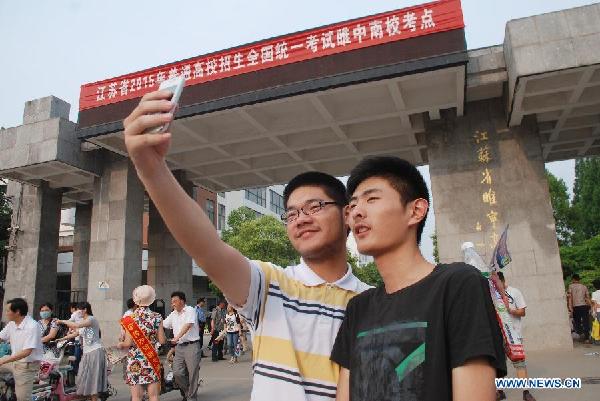Gaokao reveals unhealthy college contest
- By Xiong Bingqi
 0 Comment(s)
0 Comment(s) Print
Print E-mail China Daily, July 4, 2016
E-mail China Daily, July 4, 2016
|
|
|
Students pose for a selfie after finishing the National College Entrance Examin Suining County, east China's Jiangsu Province, June 9, 2015?[Xinhua] |
Peking University and Tsinghua University, the two most prestigious institutions of higher education, dived head on into a competition to attract top scorers immediately after the results of the national college entrance examination (known in Chinese as gaokao) were announced. Media reports say the two highest scorers from Hebei province were admitted by the two universities on the very night the results were announced.
The education authorities have instructed the exam departments not to release the details of the top scorers. But every year the top scorers have drawn the attention of the media, schools and the public alike, and the competition between the country's two top universities has exposed the unhealthy college admission criteria. The two universities' emphasis on scores reflects not only their weakness for top scorers, but also their neglect for cultivating talent.
Generally, good universities across the world organize follow-up surveys to analyze their graduates' performances and interaction with people in the real world, and adjust their admission criteria according to the results. Some reports suggest a few universities have reduced their admission quotas for Asian students after their surveys found that even Asian students who score high marks lack creativity and the ability to plan out their lives.
Chinese universities, which are focused on students' scores, generally don't conduct such follow-up surveys even after the reform of college admission rules. No wonder there is disconnection among Chinese universities' enrollment procedure, cultivation of talent and employment of their graduates.
The competition between China's two premier universities mirrors the poor attitude of Chinese universities when it comes to cultivating talent. The goal of independent college admission is to break the unified talent evaluation mode of gaokao and establish a multiple evaluation system to cultivate talent, instead of judging students only by their scores.
To push independent college enrollment, universities should stop focusing on students' scores in gaokao. What the Beijing universities have done is tantamount to telling the public that "what we really care about is still exam scores", not independent college admission norms.
College enrollment reform was launched in 2003 and regarded as a significant pilot program for gaokao reform. But even after 12 years, China's top two universities are still seeking students with the highest scores in gaokao, which is like saying the independent college admission reform has failed.
Their competition owes a lot to the fact that the independent college admission pilot program is still based on gaokao, that is, students who qualify for independent enrollment, too, have to take gaokao and their scores in the exam are still an important basis for their admission. So students and their parents are still focused on the scores.
Moreover, the pilot program has failed to help establish a two-way admission mechanism between colleges and students. Independent enrollment reform has increased colleges' right to choose students, but students still have limited rights to seek admission of their choice. Even today one student normally gets a call for admission from just one college.
Under such circumstances, colleges pay attention only to admission. The top criterion for good colleges becomes the number of top scorers they admit, not the cultivation of talents or the quality of graduates they produce.
Top institutions like Peking University and Tsinghua University still regard "how many top scorers we have" as the main criterion for university ranking, which in turn propels the unhealthy competition for securing high scores among students.
Therefore, the key to promoting gaokao reform is the strict implementation of independent college enrollment in the true sense of the term. Universities should explore different aspects of exams, conduct comprehensive evaluation and use multiple criteria to admit students so that candidates get to choose the college they want to study in.
The author is deputy director of the 21st Century Education. Research Institute.






